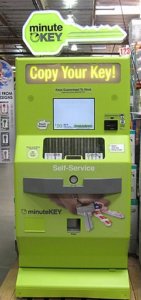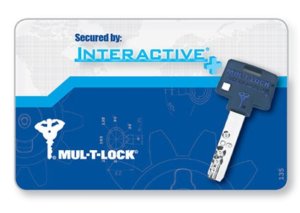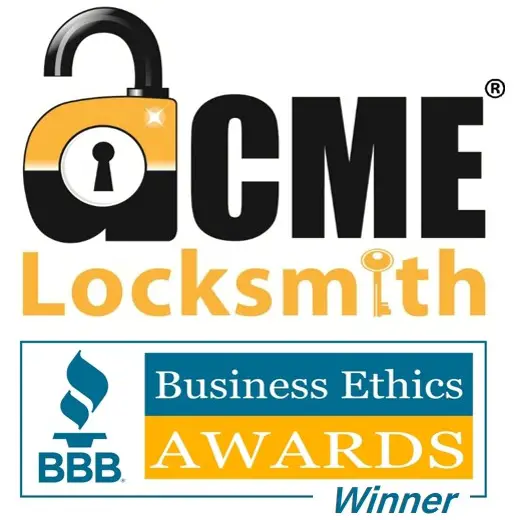Last Updated on May 8, 2025
Yes, you can duplicate a key that says Do Not Duplicate (DND). Despite the DND label, there is usually no inherent feature that prevents copying. Most key duplication services, including big-box stores and automated kiosks, will copy these keys without question, so long as the key’s specific type (keyway) is available. They may be more difficult to copy when the keyway is not common.
There isn’t any law that prevents DND keys from being copied, but in the past, they were not copied by professional locksmiths as a matter of principle. Today, you can make a copy of a key that says do not duplicate by going to a big box store, a key kiosk machines (both of which disregard the Do Not Duplicate stamp) and most locksmiths.
If you don’t want your employees making copies of your DND key, you need to upgrade your locks to a restricted, high-security key system.
Copying a DND Key in a Kiosk
You can copy a key in a key kiosk so long as it’s a typical common key.What DND Keyways Can Be Copied?

Most business keys or community keys that are stamped Do Not Duplicate are done so on common keyways. Common keyways are those that are most prevalent such as the typical keys that open homes or business. A few examples are KW1, SC1, SC10 and SC4 keys.
Because they are so common, many of the big box stores and key kiosks stock these types of keys. They ignore the Do Not Duplicate stamp and will simply copy the key with no objection.
Because so many locations are duplicating them, even most locksmiths now ignore the stamp and will copy a common keyway in order to not lose the sale.
The Copy-Protection Intent of DND Keys
Before big box stores and in-house key machines, the DND key intended to protect a business or a community from having their keys copied without their knowledge. You wouldn’t want an employee to have a copy of your business key or hundreds of non-community residents to have a copy of your community pool key.
And this worked for a time. Locksmiths honored the Do Not Duplicate stamp and would require written authorization from the business or community before making a copy of the key.
But nowadays, mass distribution of key machines led to staff that would simply ignore the DND stamp and key kiosks don’t look for it either. Because of this, even most locksmith shops will ignore the stamp on a common key and duplicate it.
We at ACME Locksmith have adopted this policy and will copy any common DND stamped key.
What Types of DND Keys Will Not be Copied?
There are hundreds of available keyways. When a business or community decides to deploy a keyway that is not common, or one that is even patented, the big box stores and key kiosks won’t have these keys available. There is not enough demand for them to stock them. So these will be much harder to duplicate.
Patented keys are issued to a specific company. And there are contractual restrictions to their duplication. They and will certainly not be available to anyone but a security company / locksmith and due to the restrictions, they will not be copied without proper authorization.
Even if a patent does not exist, most locksmiths will not duplicate a non-common DND keyway. They will honor the intent of the do not duplicate stamp since these keys cannot be duplicated just anywhere.
How to Ensure Key Copy Protection
Restricted keyways are keys that only registered companies have access to. That is, you get a lock and a key that only a security or locksmith company can sell and duplicate. The most restricted keyways may be restricted even further to just one local locksmith in a given territory. So only one company in your city can duplicate the key.
When you deploy a restricted key system, should an employee leave and give you back the key you can be confident that they did NOT make a copy of that key. Because of this, you will not have the costly expense of rekeying your business.

If you deploy locks with a restricted keyway, at ACME locksmith or from your local locksmith near you, you will only be able to get key copies at a locksmith, and in some cases only at the locksmith who sold you the system.
No one issued a key will be able to get copies anywhere else. All attempts to get copies made by an employee without your authorization will fail because it simply cannot be done. Companies registered with restricted keyways must honor the DND intent and only make keys for someone who has been authorized to do so. In almost all cases, when you are issued a restricted keyway for you business, it comes with a card that must be presented to get duplicates made. Without that card, no duplicate.
In addition to the restricted copying benefit, locks with restricted keyways are often high-security. This makes them nearly impossible to pick or to bump and can provide your business a big security improvement. More details on high-security keyways.
Summary
Anyone can duplicate a key that says do not duplicate so long as it is a commonly found key type.
If you desire keys that cannot be copied, then you will need to move into a lock system that utilizes restricted keyways.

Leave a Reply